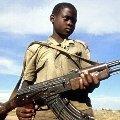Trafficking - Child Soldiers
According to the 2009 Trafficking in Persons Report issued by the U.S. State Department, "Child soldiering is a unique and severe manifestation of trafficking in persons that involves the unlawful recruitment of children -- often through force, fraud, or coercion -- for labor or sexual exploitation in conflict areas." And while the majority of unlawful child soldiers are 15 to 18 years old, children as young as 7 or 8 have been used in hostilities.
The UN Optional Protocol to the Convention on the Rights of the Child on the involvement of children in armed conflict has been ratified by 128 countries. It requires States Parties from ensuring no child under 18 is compulsorily recruited into governmental armed forces or takes a direct part in hostilities. It also requires States Parties to raise the age of voluntary recruitment of children into governmental armed forces to an age above 15 and to put into place specific safeguards to ensure such recruitment is truly voluntary.
In addition, States Parties are obligated to take all feasible measures to prevent recruitment and use of those under 18 in armed groups distinct from the armed forces of a state. Therefore the Optional Protocol works to ensure that certain children, depending on their age and manner of recruitment, are not only prevented from being used as child soldiers that carry and use arms, but are also prevented from being used as cooks, porters and messengers in armed forces and groups.
Although it is not possible to accurately calculate the number of children involved in armed conflict, unlawful child soldiering is a global phenomenon. The problem is most critical in Africa and Asia, but nearly always, where there is armed conflict, there are unlawful child soldiers. Children are often abducted, or at times sold, to be used as combatants. In addition to participating in combat-related activities, child soldiers are sometimes forced to engage in hazardous activities such as laying mines, and are frequently killed or wounded. Some have been forced to commit atrocities, and most suffer psychological scarring. Both male and female child soldiers are often sexually abused and are at high risk of contracting sexually transmitted diseases.
The sale and trafficking of children and their entrapment in any form must be eradicated, but none more so than their unlawful recruitment for labor or sexual exploitation in conflict areas. All nations must work together with international organizations and non-governmental organizations to take urgent action to disarm, demobilize and reintegrate unlawful child soldiers.

